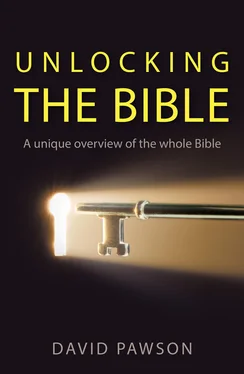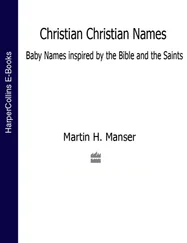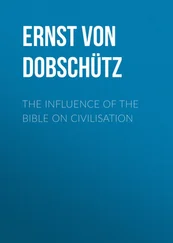1 The serpent was the devil in disguise; he can appear as an angel or an animal.
2 God enabled an animal to talk, as he did with Balaam’s ass.
3 The animal was possessed by an evil spirit. Just as Jesus sent the demons tormenting a man down the Gadarene cliffs into the bodies of 2,000 pigs, so it is perfectly possible for Satan to take over an animal. This would fool Adam and Eve, because Satan was putting himself below them. In fact Satan is a fallen angel, just as real as human beings, more intelligent and stronger than we are.
It is significant that Satan went for Eve. In very general terms, women tend to be more trusting than men, who are notoriously distrustful. Capitalizing on this, Satan subverts God’s order and treats Eve as if she were the head of the house. Although it is clear that Adam is there with Eve, he says nothing. He should be protecting her, arguing with Satan. After all, it was Adam who had heard God’s words of prohibition.
All told, there are three ways of misquoting the Word of God. One is to add something to it, another is to take something away, and a third is to change what is there. If you read the text carefully, you will find that Satan did all three. Satan knows his Bible very well, but he can misquote it and manipulate it too. Adam, however, who knew exactly what God had said, kept silent when he should have spoken up. In the New Testament he is clearly blamed for allowing sin to enter the world.
It is useful to note the strategy which Satan adopts in his approach to Eve. First he encourages doubt with the mind, second desire with the heart, and third disobedience with the will. This is always his strategy in all his dealings with humans. He encourages wrong thinking first, usually by misinterpreting God’s Word. Next he entices us to desire evil in our hearts. After that the circumstances are right for us to disobey with our wills.
What is the outcome of sin? When God questions Adam he seeks to blame both Eve and God. He speaks of ‘that woman you gave me’, or ‘the woman you put here with me’. He ceased to fulfil his role as a man by denying his responsibility to look after his wife.
God responds in judgement. This side of his character is seen for the first time: God hates sin and he must deal with it. If he is really a good God, then he cannot let people get away with badness. This is the message of Genesis 3. The punishment is given in poetic form. When God speaks in prose he is communicating his thoughts, from his mind to your mind, but when he speaks poetically he is communicating his feelings, from his heart to yours.
In Genesis 3 the poems reveal God’s angry emotions (the wrath of God, in theological terms). God feels so deeply that Eden has been ruined – and he knows too where this will lead. The following paraphrase of Genesis 1–3 sheds a fresh light on this story.
A long time ago, when nothing else existed, the God who had always been there brought the entire universe into being, the whole of outer space and this planet earth.
At first the earth was just a mass of fluid matter, quite uninhabitable and indeed uninhabited. It was shrouded in darkness and engulfed in water; but God’s own spirit was hovering just above the flood.
Then God commanded: ‘Let the light in!’ And there it was. It looked just right to God, but he decided to alternate light with darkness, giving them different names: ‘day’ and ‘night’. The original darkness and the new light were the evening and the morning of God’s first working day.
Then God spoke again: ‘Let there be two reservoirs of water, with an expanse between them’. So he separated the water on the surface from the moisture in the atmosphere. That’s how the ‘sky’, as God called it, came to be. This ended his second day’s work.
The next thing God said was: ‘Let the surface water be concentrated in one area, so that the rest may dry out.’ Sure enough, it happened! From then on, God referred to ‘sea’ and ‘land’ separately. He liked what he saw and added: ‘Now let the land sprout vegetation, plants with seed and trees with fruit, all able to reproduce themselves’. And they appeared – all kinds of plant and tree, each able to propagate its own type. Everything fitted into God’s plan. His third day’s work was over.
Now God declared: ‘Let different sources of light appear in the sky. They will distinguish days from nights and make it possible to measure seasons, special days and years; though their main purpose will be to provide illumination.’ And so it is, just as he said. The two brightest lights are the larger ‘sun’ that dominates the day and the lesser ‘moon’ which predominates at night, surrounded by twinkling stars. God put them all there for earth’s sake – to light it, regulate it and maintain the alternating pattern of light and darkness. God was pleased that his fourth day’s work had turned out so well.
The next order God issued was: ‘Let the sea and the sky teem with living creatures, with shoals of swimming fish and flocks of flying birds.’ So God brought into being all the animated things that inhabit the oceans, from huge monsters of the deep to the tiny organisms floating in the waves, and all the variety of birds and insects on the wing in the wind above. To God it was a wonderful sight and he encouraged them to breed and increase in numbers, so that every part of sea and sky might swarm with life. That ended his fifth day.
Then God announced: ‘Now let the land also teem with living creatures – mammals, reptiles and wildlife of every sort.’ As before, no sooner was it said than done! He made all kinds of wildlife, including mammals and reptiles, each as a distinct type. And they all gave him pleasure.
At this point God reached a momentous decision: ‘Now let’s make some quite different creatures, more our kind – beings, just like us. They can be in charge of all the others – the fish in the sea, the birds of the air and the animals on the land.
To resemble himself God created mankind,
To reflect in themselves his own heart, will and mind,
To relate to each other, male and female entwined.
Then he affirmed their unique position with words of encouragement: ‘Produce many offspring, for you are to occupy and control the whole earth. The fish in the sea, the birds of the air and the animals on the land are all yours to master. I am also giving you the seed-bearing plants and the fruit-bearing trees as your food supply. The birds and the beasts can have the green foliage for their food.’ And so it was.
God surveyed all his handiwork and he was very satisfied with it … everything so right, so beautiful … six days’ work well done.
Outer space and planet earth were now complete. Since nothing more was needed, God took the next day off. That is why he designated every seventh day to be different from the others, set apart for himself alone – because on that day he was not busy with his daily work on creation.
This is how our universe was born and how everything in it came to be the way it is; when the God whose name is ‘Always’ was making outer space and the planet earth, there was a time when there was no vegetation at all on the ground. And if there had been, there was neither any rain to irrigate it nor any man to cultivate it. But underground springs welled up to the surface and watered the soil. And the God ‘Always’ moulded a human body from particles of clay, gave it the kiss of life, and man joined the living creatures. And the God ‘Always’ had already laid out a stretch of parkland, east of here, a place called ‘Eden’, which means ‘Delight’. He brought the first man there to live. The God ‘Always’ had planted a great variety of trees in the part with beautiful foliage and delicious fruit. Right in the middle were two rather special trees; fruit from one of them could maintain life indefinitely while the fruit of the other gave the eater personal experience of doing right and wrong.
Читать дальше











